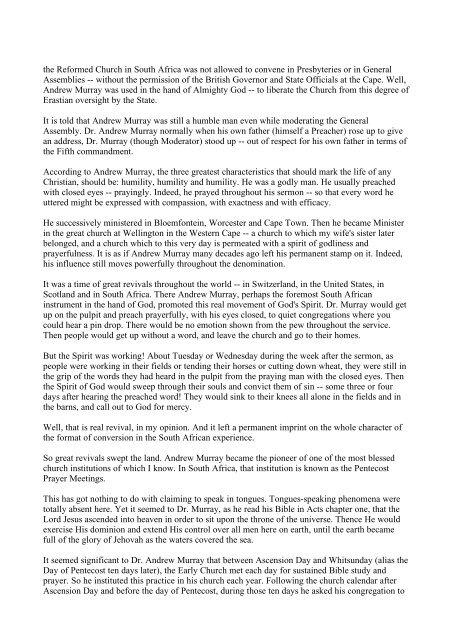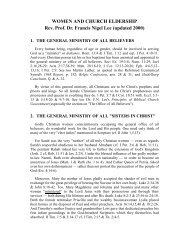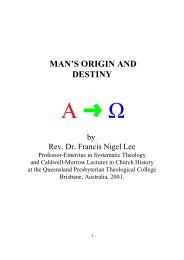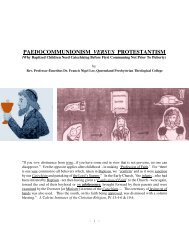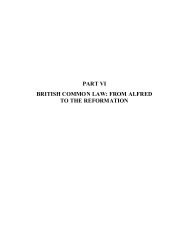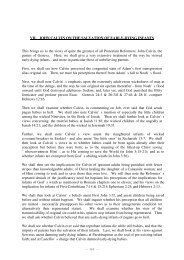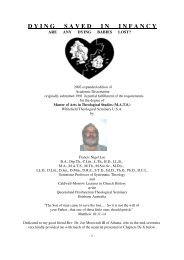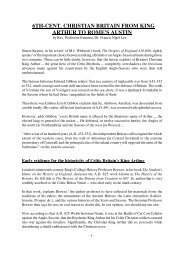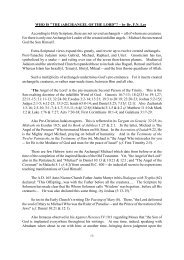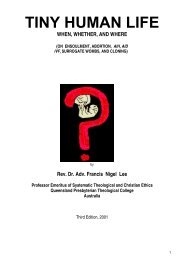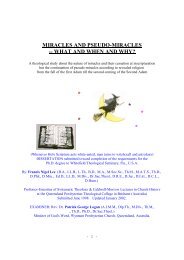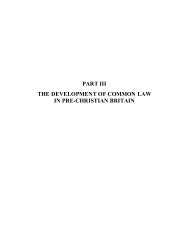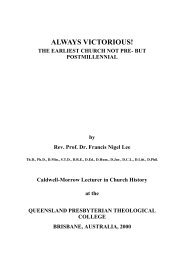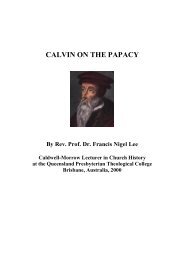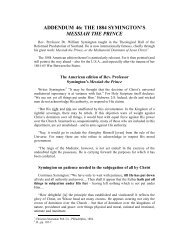glorious morn will break!Missionaries do not live before their time. <strong>The</strong>ir great idea <strong>of</strong> converting the world to Christ, is noillusion. It is divine! Christianity will triumph! It is equal to all that it has to perform!"This was the mettle <strong>of</strong> those mighty missionaries, as they went out deeper and deeper from SouthAfrica into the areas to the north. And in the wake <strong>of</strong> all this, the stirring Reformed Church <strong>of</strong>South Africa too marched through into Rhodesia (alias the modern Zimbabwe). <strong>The</strong>re, after not toolong, the Reformed Church had a larger number <strong>of</strong> members among the converted Blacks than allthe other kinds <strong>of</strong> Christian denominations combined -- even though not one half <strong>of</strong> the Blackpopulation there has yet been christianised.Well now, the Scots arrived -- the Scottish Presbyterians. Many, if not most <strong>of</strong> them, were soonafrikanerised -- within the South African Reformed Church. Many Scottish place names inSouthern Africa in the nineteenth century attest to this new strain now coming into AfrikanerCalvinism. For there are South African place names such as Carnarvon, Cradock, MacGregor,Dundee, and Edinburgh -- and also a desert town in the Eastern Cape called Aberdeen.But, <strong>of</strong> course, the greatest and most famous <strong>of</strong> all the Scottish Preachers that arrived, was thefather <strong>of</strong> the world famous Dr. Andrew Murray. Dr. Murray was not a Scot by birth. His fatherwas, but not he. His father came out from Scotland -- but soon afrikanerised and became theMinister <strong>of</strong> the Reformed Church in Graaff-Reinet --just thirty miles from the Aberdeen to which Ihave just referred. Graaff-Reinet was the pulpit where Dr. Daniel Francois Malan, round about1912 or 1913, later gave his farewell sermon -- "Whether we eat or drink or whatever we do, weare to do all to the glory <strong>of</strong> God" -- and promptly entered politics and finally became the SouthAfrican Prime Minister.Dr. Andrew Murray grew up in that Reformed manse, where his father was the Reformed Preacher.<strong>The</strong>re is a grapevine growing in the yard <strong>of</strong> that manse to this day. It was there when AndrewMurray was a little boy and it is still bearing grapes today. Andrew grew up in strict Calvinism.<strong>The</strong>n he went to Scotland and to Holland, in order to study theology at a time when the liberalismthat Groen van Prinsterer and Kuyper would later arise to oppose had swept through the land andeven the theological seminaries.On arrival in Holland, Andrew Murray was very instrumental in supporting the conservativeCalvinist Student Association there at the Seminary -- called "Zekar Dabar." That, you may detect,is Hebrew for: "Remember the Word! Murray was very instrumental as a South African student, infighting against Dutch theological liberalism. He also studied German theology massively. <strong>The</strong>n hereturned to South Africa in 1848.Back in South Africa, he soon became known as a godly man and a man <strong>of</strong> great prayer andhumility. In 1853, he represented the Orange Free State at the political independence talks inEngland. In 1860, he pioneered the annual ten-day Pentecost Prayer Meetings. And in 1862, hebecame Moderator <strong>of</strong> the General Assembly <strong>of</strong> the Reformed Church <strong>of</strong> South Africa (for the first<strong>of</strong> six times).Murray was instrumental in liberating the South African Church from the control <strong>of</strong> the (Britishdominated)South African State. Back in 1806, the British had taken over the Cape -- with theirown idea <strong>of</strong> the Queen being the earthly head <strong>of</strong> the Anglican Church under God. Indeed, they hadsought to inflict this pattern even on the Reformed Church!Having the political clout, the British were able to try to do this -- for a few decades. At that time,
the Reformed Church in South Africa was not allowed to convene in Presbyteries or in GeneralAssemblies -- without the permission <strong>of</strong> the British Governor and State Officials at the Cape. Well,Andrew Murray was used in the hand <strong>of</strong> Almighty God -- to liberate the Church from this degree <strong>of</strong>Erastian oversight by the State.It is told that Andrew Murray was still a humble man even while moderating the GeneralAssembly. Dr. Andrew Murray normally when his own father (himself a Preacher) rose up to givean address, Dr. Murray (though Moderator) stood up -- out <strong>of</strong> respect for his own father in terms <strong>of</strong>the Fifth commandment.According to Andrew Murray, the three greatest characteristics that should mark the life <strong>of</strong> anyChristian, should be: humility, humility and humility. He was a godly man. He usually preachedwith closed eyes -- prayingly. Indeed, he prayed throughout his sermon -- so that every word heuttered might be expressed with compassion, with exactness and with efficacy.He successively ministered in Bloemfontein, Worcester and Cape Town. <strong>The</strong>n he became Ministerin the great church at Wellington in the Western Cape -- a church to which my wife's sister laterbelonged, and a church which to this very day is permeated with a spirit <strong>of</strong> godliness andprayerfulness. It is as if Andrew Murray many decades ago left his permanent stamp on it. Indeed,his influence still moves powerfully throughout the denomination.It was a time <strong>of</strong> great revivals throughout the world -- in Switzerland, in the United States, inScotland and in South Africa. <strong>The</strong>re Andrew Murray, perhaps the foremost South Africaninstrument in the hand <strong>of</strong> God, promoted this real movement <strong>of</strong> God's Spirit. Dr. Murray would getup on the pulpit and preach prayerfully, with his eyes closed, to quiet congregations where youcould hear a pin drop. <strong>The</strong>re would be no emotion shown from the pew throughout the service.<strong>The</strong>n people would get up without a word, and leave the church and go to their homes.But the Spirit was working! About Tuesday or Wednesday during the week after the sermon, aspeople were working in their fields or tending their horses or cutting down wheat, they were still inthe grip <strong>of</strong> the words they had heard in the pulpit from the praying man with the closed eyes. <strong>The</strong>nthe Spirit <strong>of</strong> God would sweep through their souls and convict them <strong>of</strong> sin -- some three or fourdays after hearing the preached word! <strong>The</strong>y would sink to their knees all alone in the fields and inthe barns, and call out to God for mercy.Well, that is real revival, in my opinion. And it left a permanent imprint on the whole character <strong>of</strong>the format <strong>of</strong> conversion in the South African experience.So great revivals swept the land. Andrew Murray became the pioneer <strong>of</strong> one <strong>of</strong> the most blessedchurch institutions <strong>of</strong> which I know. In South Africa, that institution is known as the PentecostPrayer Meetings.This has got nothing to do with claiming to speak in tongues. Tongues-speaking phenomena weretotally absent here. Yet it seemed to Dr. Murray, as he read his Bible in Acts chapter one, that theLord Jesus ascended into heaven in order to sit upon the throne <strong>of</strong> the universe. <strong>The</strong>nce He wouldexercise His dominion and extend His control over all men here on earth, until the earth becamefull <strong>of</strong> the glory <strong>of</strong> Jehovah as the waters covered the sea.It seemed significant to Dr. Andrew Murray that between Ascension Day and Whitsunday (alias theDay <strong>of</strong> Pentecost ten days later), the Early Church met each day for sustained Bible study andprayer. So he instituted this practice in his church each year. Following the church calendar afterAscension Day and before the day <strong>of</strong> Pentecost, during those ten days he asked his congregation to
- Page 1 and 2: THE CHRISTIAN AFRIKANERSA Brief His
- Page 3 and 4: God richly bless the following lect
- Page 5 and 6: There have always been, and always
- Page 7 and 8: But the only one they both appeal t
- Page 9 and 10: Now Zuidema was a very great Dutch
- Page 11 and 12: Dutch churches at the Synod of Dord
- Page 13 and 14: station -- to help the Dutch ships
- Page 15 and 16: It is a country dedicated to freedo
- Page 17 and 18: 1760 -- there was more and more dis
- Page 19 and 20: with the Dutch. Many moved farther
- Page 21 and 22: said: "The British have placed our
- Page 23 and 24: financed by White money. It is buil
- Page 25 and 26: Famous Boer Generals, left to right
- Page 27 and 28: Three: Unannihilated: the Resurrect
- Page 29 and 30: (who had arrived in the country onl
- Page 31 and 32: of success.I may add that White Sou
- Page 33 and 34: General Beyers felt that those text
- Page 35 and 36: Balfour Declaration. The gist of it
- Page 37 and 38: Africa; treks on into the land both
- Page 39 and 40: Four: The Eschatology of Victory in
- Page 41 and 42: ide -- to use the instrumentality o
- Page 43 and 44: Christian National Calvinist Public
- Page 45 and 46: through constitutional process it h
- Page 47 and 48: I guess the best way to describe Sm
- Page 49 and 50: He was followed after his assassina
- Page 51: So the Scots came. I am going to sp
- Page 55 and 56: ook on Hebrews. But his greatest wr
- Page 57 and 58: At that point, Du Plessis enquired
- Page 59 and 60: Yet quite apart from this high view
- Page 61 and 62: One last point. There is a tremendo
- Page 63 and 64: African Republic in 1902, the Cape
- Page 65 and 66: One of the most important Calvinist
- Page 67 and 68: Pellissier, who wrote on music and
- Page 69 and 70: perspective -- even while he minist
- Page 71 and 72: ever encountered by the Whites in S
- Page 73 and 74: Now the United States does not need
- Page 75 and 76: majority of the White citizens are
- Page 77 and 78: Now you will not find in any of Sto
- Page 79 and 80: Finally, Stoker argues that the so-
- Page 81 and 82: This then brings Stoker to another
- Page 83 and 84: This Brummer just referred to, is a
- Page 85 and 86: Man was to rejoice in this nature (
- Page 87 and 88: enhanced. For, in the present, man
- Page 89 and 90: he declared, riddled with the ungod
- Page 91 and 92: Van der Waal is a very brilliant So
- Page 93 and 94: World War II when he was hiding fro
- Page 95 and 96: The Professor of Philosophy -- or I
- Page 97 and 98: glory.There are also Christian psyc
- Page 99 and 100: Then there are Christian criminolog
- Page 101 and 102: Massachusetts at Gordon- Conwell fo
- Page 103 and 104:
well known -- is being pioneered in
- Page 105 and 106:
people in South Africa. The South A
- Page 107 and 108:
nature and of human culture (Prover
- Page 109 and 110:
The parousia of Jesus Christ will i
- Page 111 and 112:
more and more christianised. Later
- Page 113:
END


